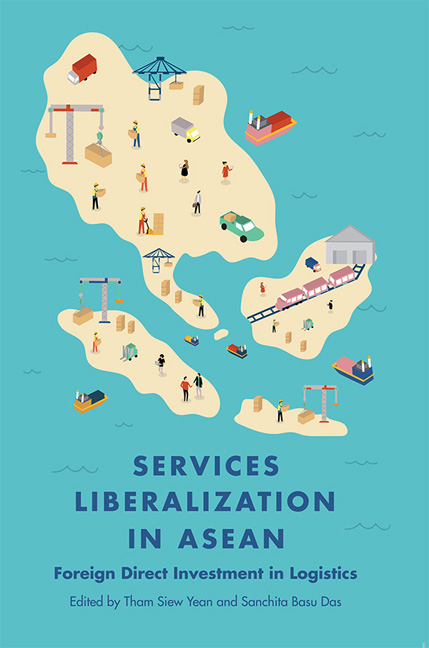Book contents
- Frontmatter
- CONTENTS
- List of Tables
- List of Figures
- Foreword
- Preface
- Acknowledgements
- Abbreviations
- About the Contributors
- 1 Introduction
- 2 Reforming Indonesia's Logistics Sector
- 3 FDI Liberalization in Malaysia's Logistics Services
- 4 Logistics Services Liberalization in the Philippines
- 5 Services Sector Liberalization in Singapore: Case of the Logistics Sector
- 6 Logistics Services Liberalization in Thailand
- 7 Services Liberalization in Vietnam: The Case of FDI in Logistics Sector
- 8 Services Liberalization: Case of Logistics in Brunei
- 9 FDI, Services Liberalization and Logistics Development in Cambodia
- 10 Services Liberalization in Lao PDR: FDI in Logistics Sector of a Land-linked Country
- 11 Facilitating FDI for the Logistics Sector in Myanmar: Agency, Incentives, and Institutions
- Index
6 - Logistics Services Liberalization in Thailand
Published online by Cambridge University Press: 04 July 2018
- Frontmatter
- CONTENTS
- List of Tables
- List of Figures
- Foreword
- Preface
- Acknowledgements
- Abbreviations
- About the Contributors
- 1 Introduction
- 2 Reforming Indonesia's Logistics Sector
- 3 FDI Liberalization in Malaysia's Logistics Services
- 4 Logistics Services Liberalization in the Philippines
- 5 Services Sector Liberalization in Singapore: Case of the Logistics Sector
- 6 Logistics Services Liberalization in Thailand
- 7 Services Liberalization in Vietnam: The Case of FDI in Logistics Sector
- 8 Services Liberalization: Case of Logistics in Brunei
- 9 FDI, Services Liberalization and Logistics Development in Cambodia
- 10 Services Liberalization in Lao PDR: FDI in Logistics Sector of a Land-linked Country
- 11 Facilitating FDI for the Logistics Sector in Myanmar: Agency, Incentives, and Institutions
- Index
Summary
Introduction
Trade in services plays an important role in the economic development of a country. The Asian Development Bank (ADB) in 2012 reported that the services sector of ASEAN member countries contributed around 28.1 per cent to 70.1 per cent to their Gross Domestic Product (GDP) from 2000 to 2007 respectively (Park and Shin 2012, p. 35). Among ASEAN countries, Singapore's services sector accounts for around 70.1 per cent of its GDP — highest in the region, followed by the Philippines (50.3 per cent), Malaysia (50 per cent), Thailand (47.7 per cent), and Vietnam (43.3 per cent). Wholesale and retail business has taken up the highest proportion in terms of value added in the services sector in ASEAN, followed by finance and insurance. Singapore has the highest employment share in the services sector, followed by Malaysia, the Philippines, Indonesia, and Thailand.
According to the ASEAN Economic Community (AEC) Blueprint 2025, ASEAN member states (AMS) are required to cooperate under the ASEAN Framework Agreement on Services (AFAS). AMS need to be compliant with the agreed upon liberalization programmes, procedures, and timeframe. One of the objectives of the AFAS is to decrease and eliminate restrictions to trade in services based on the twelve types of services, as classified in the General Agreement on Trade in Services (GATS). These are business services, communication services, construction services, distribution services, education services, environmental services, financial services, health and social services, transport and tourism services, leisure, cultural and sports services, transportation services, and other services that are not included in the above eleven fields, such as spa and beauty services.
According to the established protocols, if any AMS has any reservations or limitations with regard to any measures, these should be specified in the horizontal commitment table. These commitments are legally binding between members. Logistics and other related services fall mostly within the domain of the transport sector and that complicates matters as logistics is much more than just transport related services. Logistics in ASEAN has been identified as a priority integration sector with its own liberalization roadmap by 1 January 2013 (Tongzon 2011).
- Type
- Chapter
- Information
- Services Liberalization in ASEANForeign Direct Investment in Logistics, pp. 181 - 211Publisher: ISEAS–Yusof Ishak InstitutePrint publication year: 2017

